The Mammy Archetype: A Black Maiden Syndrome
- By iforcolor in Actress, History, Vaudeville
-
February 1, 2025

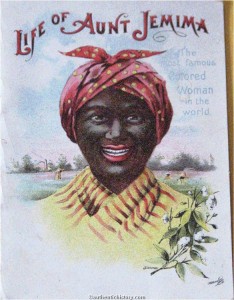 “Aunt Jemima is a brand of pancake mix, syrup, and other breakfast foods currently owned by the Quaker Oats Company of Chicago. The trademark dates to 1893, although Aunt Jemima pancake mix debuted in 1889. The Quaker Oats Company first registered the Aunt Jemima trademark in April 1937.[1] Aunt Jemima originally came from a minstrel show as one of their pantheon of stereotypical African American characters. Aunt Jemima appears to have been a postbellum addition to that cast” –
“Aunt Jemima is a brand of pancake mix, syrup, and other breakfast foods currently owned by the Quaker Oats Company of Chicago. The trademark dates to 1893, although Aunt Jemima pancake mix debuted in 1889. The Quaker Oats Company first registered the Aunt Jemima trademark in April 1937.[1] Aunt Jemima originally came from a minstrel show as one of their pantheon of stereotypical African American characters. Aunt Jemima appears to have been a postbellum addition to that cast” –
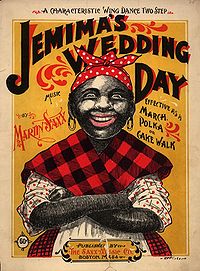
“Jemima” character on 1899 cakewalk sheet music cover.
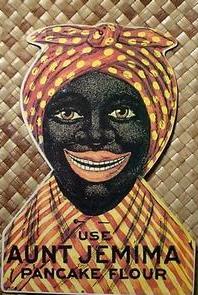
Aunt Jemima (1893)
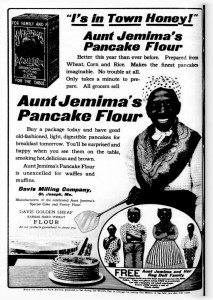
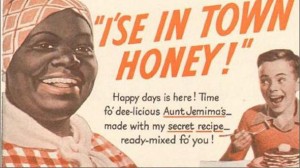
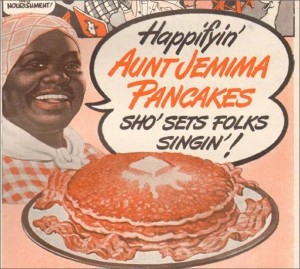 “For two more decades, the stereotype continued, with its advertising; and ‘live Aunts’ being blues singer, Edith Wilson, actress Ethel Ernestine Harper, Quaker employee, Rosie Hall and actress, Aylene Lewis, who was the last Aunt, playing her until the 1960s.”
“For two more decades, the stereotype continued, with its advertising; and ‘live Aunts’ being blues singer, Edith Wilson, actress Ethel Ernestine Harper, Quaker employee, Rosie Hall and actress, Aylene Lewis, who was the last Aunt, playing her until the 1960s.”
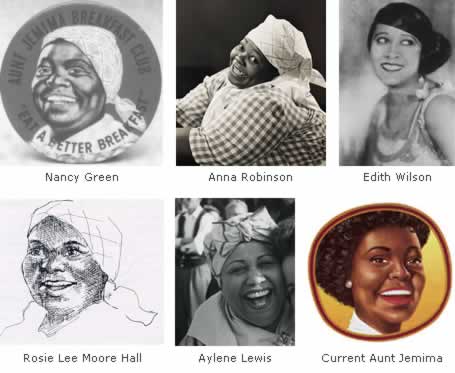
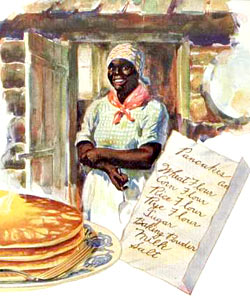
Black actors and the Dress
“Male comedians appearing in drag seemingly has universal appeal that cuts across cultural lines. Eddie Murphy, Martin Lawrence, Jamie Foxx, Kenan Thompson of “Saturday Night Live” and Tyler Perry are among the African-American performers who have generated laughs by cross-dressing.
But despite the popularity of Perry’s gun-toting, insult-hurling Madea, Lawrence’s turns as Sheneneh on his sitcom “Martin” and the cranky title character in “Big Momma’s House,” and the various women Murphy has played in “The Nutty Professor” films and “Norbit,” some observers inside and outside African-American creative circles say the sight of black male performers in drag also carries troubling cultural baggage. They contend the caricatures are no laughing matter and jeopardize the image of African-American masculinity.” – Baltimore Sun

“John Singleton griped to Black Star News, “I’m tired of all these Black men in dresses … How come nobody’s protesting that?” And comedian Dave Chappelle told Oprah Winfrey that during a shoot with Lawrence, the writers and producers had twisted his arm to do drag. “‘Every minute you waste costs this much money,'” he recalls them telling him. “The pressure comes in … I don’t need no dress to be funny,” he said. Chappelle also suggested that their insistence amounted to a “conspiracy,” and he got applause for implying a connection between cross-dressing and “Brokeback Mountain,” a film in which neither main character — both of whom are arguably bisexual — wears anything but hyper-masculine attire.
Chappelle’s comment both presumes that impersonating a woman will emasculate him, and that emasculation is equivalent to homosexuality (or at least gay sex, judging by his poorly chosen example). Despite Chappelle’s insinuation, it’s debatable whether this phenomenon has much to do with a gay sensibility. Perry has denied the abundant rumors about his sexuality, telling Essence magazine that having to fend off the speculation has “given [him] a firm seating in [his] manhood.”
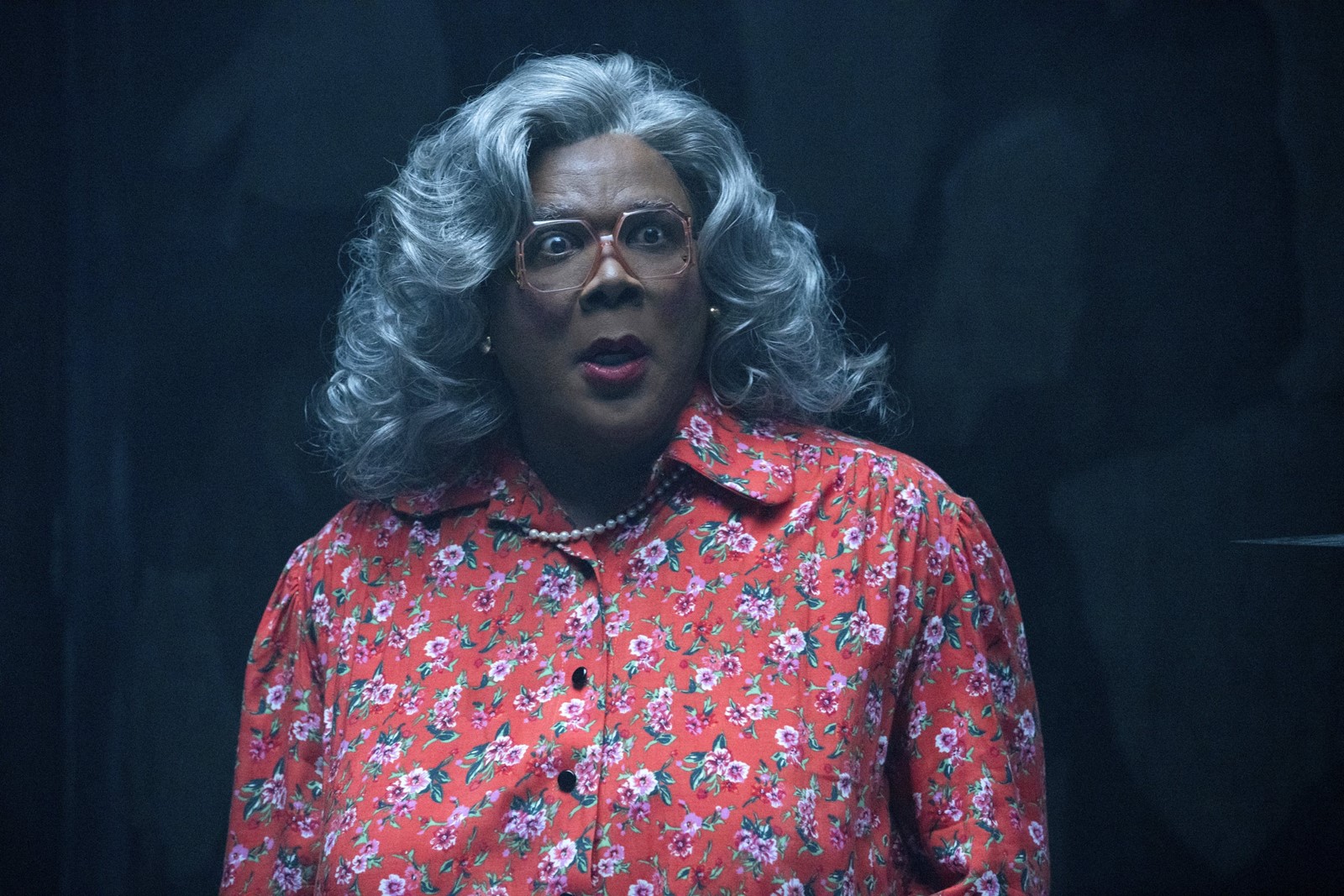
The newest breed of bruthas in drag has only the most tenuous connection to the decidedly queer cross-dressing entertainment craze of the ’90s, exemplified by Wigstock, “Priscilla, Queen of the Desert,” and “To Wong Foo” — the main difference being the emphasis on frumpiness.
When straight Black comedians do drag, they aren’t trying to make women look fabulous. They reach for the floral housecoats and the chartreuse polyester pantsuits. It’s anyone’s guess why the no-nonsense old ladies hold more appeal for them — perhaps grandmotherly aggression and take-no-prisoners masculine attitude have more in common than meets the eye. The clumsy fashion sense is certainly a match.
Like Chappelle, blogger Darryl James sees the phenomenon as part of an effort to neutralize Black masculinity. For him and a lot of other straight Black men, gender-bending comedians are “castrated clowns,” whose emasculation makes them palatable to White people and man-hating Black women alike. “The Black man in drag is one of the new coons,” he writes. Never mind that he’s also one of the old coons — according to Marjorie Garber’s 1999 book, “Vested Interests,” the men who played women in minstrel shows were “the best-paid performers in the minstrel company.”
If the humor in minstrelsy arises in part from the reversal of class aspirations, then White men adopting the comic appearance of Black women represents the ultimate topsy-turvy world. We consider upward mobility natural (even if we frown on strategies for advancement that include, say, passing for White), but downward mobility is crazy. And so a Black man who plays the role of a Black woman is also taking part in the ridicule of people who in some respects lie further down the social pecking order, in terms of gender if not economic power, mimicking discrimination by Whites against people of color.” – Copyright © 2023 Salon.com
~*~
- Abbey Lincoln, Al Jolson, Amanda Randolph, Anna Robinson, Barbara Stanwyck, Beau Bridges, Bette Davis, Bob Corley, Butterfly McQueen, Cicely Tyson, Clark Gable, Claudia McNeil, D.W. Griffith, Dale Ricardo Shields, David O. Selznick, Diahann Carroll, Dorothy Dandrige, Edith Wilson, Estelle Evans, Esther Rolle, Ethel Waters, Harriet Beecher Stowe, Hattie McDaniel, Hess Love, Ida B. Wells, James Weldon Johnson, Jean Harlow, Jennie Lee, John Kenrick, John Wesley Holloway, Kathryn Stockett, Langston Hughes, Lauri Peters, Lillian Randolph, Louis Armstrong, Louise Beavers, Marla Gibbs, Marlon Hurt, Maxine Sullivan, Nan Martin, Nancy Green, Nell Carter, Octavia Spencer, Oprah Winfrey, Otis McDaniel, Rosie Lee Moore Hall, Ruby Dandridge, Sanaa Lathan, Shirley Temple, Sidney Poitier, Sojourner Truth, Theresa Harris, Viola Davis, Virginia Capers, Vivien Leigh, Whoopi Goldberg, William Hanna
iforcolor
ARCHIVIST, EDUCATOR, HISTORIAN, and ARTiST
Dale Ricardo Shields is highly accomplished African American actor, director, producer, and educator with a distinguished career in theatre and academia.
Here's a summary of his background and achievements:
Early Life and Family:
Born on November 4, 1952, in Cleveland, Ohio.
His family has a strong musical background; his grandfather and father were founding members of the Shields Brothers Gospel Quartet of Ohio, and his mother was part of the Turner Gospel Singers.
He is a cousin of boxing promoter Don King.
Education:
Graduated from John F. Kennedy High School in 1970.
Holds both a BFA (1975) and MFA (1995) from Ohio University.
Career and Contributions
Theatre Professional:
Actor: Has appeared on Broadway, Off-Broadway, Off-Off-Broadway, and in regional productions. His television credits include The Cosby Show, Another World, Guiding Light, Saturday Night Live, and the ITV series Special Needs. He has also appeared in commercials and films.
Director and Stage Manager: Has extensive professional credits in these roles, including projects at Lincoln Center, The Henry Street Settlement House (New Federal Theatre), The Negro Ensemble Company, and The Joseph Papp Public Theatre.
Assistant Director: Served as assistant to Lloyd Richards and assistant director for the New Federal Theatre premiere of Ossie Davis's play A Last Dance With Sybil starring Ruby Dee and Earl Hyman.
Educator:
Professor: He is a Professor of Acting, Directing, Black Theatre, Black Studies, and Stage Management. He has taught at various institutions, including Ohio University, The College of Wooster, Denison University, Macalester College, Susquehanna University (as artist-in-residence), and SUNY Potsdam.
Workshops and Programs: Conducted workshops for Joseph Papp's Playwriting in the Schools Program (PITS) at The Public Theatre for six seasons and represented the United States at the ASSITEJ Theatre Festival in London, England, in 1988.
Artistic Activist and Historian:
Iforcolor.org: Creator and archivist for the Black History website Iforcolor.org, dedicated to preserving and sharing information about African Americans and artists of color. He also maintains the "Black Theatre/African American Voices" website on Facebook.
Project1VOICE Liaison: Serves as the Project1VOICE Liaison for the state of Ohio, directing "One Play One Day" events in Cleveland since 2011.
Awards and Recognition:
The Kennedy Center/Stephen Sondheim Inspirational Teacher Award: Recipient in 2017.
Paul Robeson Award: Recipient in 2021 (jointly presented by the Actors' Equity Association and Actors' Equity Foundation).
AUDELCO/"VIV" Special Achievement Award: Received in 2017.
Tony Award Nominee: Nominated for the "Excellence in Theatre Education Award" in 2015 and 2017.
Ebony Bobcat Network (EBN) Legend Award: Received from Ohio University in 2022.
ENCORE AWARD / The Actors Fund: Received in 2020, 2021, 2022, and 2024.
Outstanding Professor Awards: Has received two of these and three "Educational Program of the Year" awards as a university professor.
The HistoryMakers archives: Interviewed and included in The HistoryMakers archives, permanently housed in the Library of Congress.
Dale Ricardo Shields is recognized for his profound impact on the lives of his students and his unwavering dedication to preserving and promoting Black theatre history and culture.
